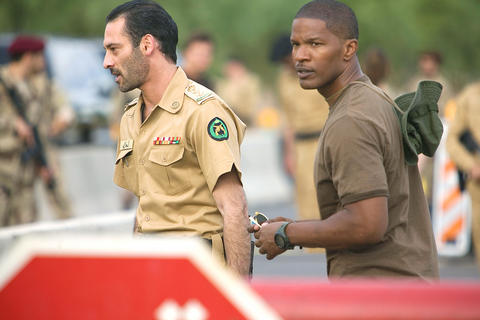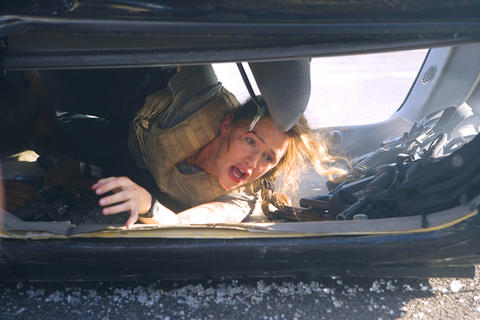What good is geopolitical turmoil if you can't have some fun with it? Hollywood has been posing that rhetorical question for a long time now - from Ninotchka to Rambo by way of a battalion of World War II combat pictures - but it has so far been a bit squeamish about turning the various post-Sept. 11 conflicts into grist for escapist entertainment.
The Kingdom, a whodunit/blow-'em-up directed by Peter Berg, corrects this lapse by taking aim at the ethical nuances and ideological contradictions of the war on terror and blasting away.
Berg, an actor whose directing skills improve with each project (his last for the big screen was the underrated Friday Night Lights), shows himself adept at the rapid cutting and hectic camerawork that are fast becoming the lingua franca of action filmmaking.

PHOTO: COURTESY OF UNIVERSAL STUDIOS
The Kingdom takes the breathless visual precision of the Jason Bourne movies out of the abstract hall-of-mirrors universe of intra-CIA skulduggery and into a semi-plausible world of international tension. Rather than explore that tension, as some other, more ostentatiously serious movies coming out shortly seem poised to do, Berg and Matthew Michael Carnahan, the screenwriter, do what they can to relieve it with fireballs and frantic chases. The result is a slick, brutishly effective genre movie: Syriana for dummies.
Which is not entirely a put-down. Intricate, earnest puzzles have their place in the movie cosmos, but so do lean, linear stories with clearly defined villains and heroes and lots of explosions.
The members of the cast, which includes two recent Academy Award winners (Jamie Foxx and Chris Cooper), do not trouble themselves exploring the finer points of their craft, but their unpretentious professionalism is nonetheless satisfying to watch. Foxx does most of his acting with the muscles in his jaw and his upper arm, delivering terse dialogue in a silky whisper. Cooper punches the folksiness buttons as a forensics expert whose aw-shucks manner masks a steel-trap mind. Jason Bateman is the class clown, and Jennifer Garner, no slouch in the jaw-flexing department, also exercises her tear ducts and her trigger finger.

PHOTO: COURTESY OF UNIVERSAL STUDIOS
The four of them play FBI investigators who travel to Saudi Arabia (the kingdom of the title) to investigate a horrific double terrorist attack on US oil company workers and their families. The team's trip is opposed by the State Department and the lily-livered attorney general (Danny Huston), who don't want to antagonize an important ally. Backed up by their no-nonsense boss (Richard Jenkins), the Forensic Four nonetheless head to Riyadh.
Their motives are personal as well as professional, since one of their colleagues was killed in the attacks. Their presence is barely tolerated by the Saudi authorities, many of whom are either incompetent or in cahoots with the jihadis. Meanwhile, Jeremy Piven shows up as an embassy flunky whose job is to prevent Special Agent Fleury (Foxx) and his colleagues from doing theirs.
But Fleury recognizes a fellow good cop in the person of Faris al-Ghazi (Ashraf Barhom), a Saudi colonel who helps the Americans both before and after the bullets and rocket-propelled grenades start flying. Once they do, the good guys are in the familiar, physically perilous but morally gratifying position of being out-manned and outgunned with the cavalry nowhere in sight.
"I'm not saying America is perfect," Fleury says, "but we're pretty good at this." If by "this" he means making high-impact action movies, it's hard to argue. And The Kingdom, hair-raising as it is, is also curiously soothing in its depiction of US competence and righteousness.
Just as Rambo offered the fantasy of do-over on Vietnam, The Kingdom can be seen as a wishful revisionist scenario for the US response to Islamic fundamentalist terrorism. In some ways it's an anti-Iraq movie, not because it expresses opposition to the war there but rather because it makes no mention of it. Instead, the film spins a cathartic counter-narrative. After a murderous terrorist attack a few of our best people - four, rather than a few hundred thousand - go over to the country that spawned the terrorists, kill the bad guys and come home. And they even leave the door open for a sequel.

On April 26, The Lancet published a letter from two doctors at Taichung-based China Medical University Hospital (CMUH) warning that “Taiwan’s Health Care System is on the Brink of Collapse.” The authors said that “Years of policy inaction and mismanagement of resources have led to the National Health Insurance system operating under unsustainable conditions.” The pushback was immediate. Errors in the paper were quickly identified and publicized, to discredit the authors (the hospital apologized). CNA reported that CMUH said the letter described Taiwan in 2021 as having 62 nurses per 10,000 people, when the correct number was 78 nurses per 10,000

As we live longer, our risk of cognitive impairment is increasing. How can we delay the onset of symptoms? Do we have to give up every indulgence or can small changes make a difference? We asked neurologists for tips on how to keep our brains healthy for life. TAKE CARE OF YOUR HEALTH “All of the sensible things that apply to bodily health apply to brain health,” says Suzanne O’Sullivan, a consultant in neurology at the National Hospital for Neurology and Neurosurgery in London, and the author of The Age of Diagnosis. “When you’re 20, you can get away with absolute

May 5 to May 11 What started out as friction between Taiwanese students at Taichung First High School and a Japanese head cook escalated dramatically over the first two weeks of May 1927. It began on April 30 when the cook’s wife knew that lotus starch used in that night’s dinner had rat feces in it, but failed to inform staff until the meal was already prepared. The students believed that her silence was intentional, and filed a complaint. The school’s Japanese administrators sided with the cook’s family, dismissing the students as troublemakers and clamping down on their freedoms — with

As Donald Trump’s executive order in March led to the shuttering of Voice of America (VOA) — the global broadcaster whose roots date back to the fight against Nazi propaganda — he quickly attracted support from figures not used to aligning themselves with any US administration. Trump had ordered the US Agency for Global Media, the federal agency that funds VOA and other groups promoting independent journalism overseas, to be “eliminated to the maximum extent consistent with applicable law.” The decision suddenly halted programming in 49 languages to more than 425 million people. In Moscow, Margarita Simonyan, the hardline editor-in-chief of the